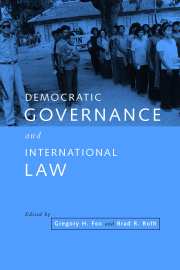Book contents
- Frontmatter
- Contents
- List of contributors
- List of acknowledgments
- Introduction: the spread of liberal democracy and its implications for international law
- PART I THE NORMATIVE FOUNDATIONS OF A RIGHT TO POLITICAL PARTICIPATION
- 1 Legitimacy and the democratic entitlement
- 2 The right to political participation in international law
- 3 Democracy and the body of international law
- PART II DEMOCRACY AND INTER-STATE RELATIONS
- PART III DEMOCRACY AND THE USE OF FORCE
- PART IV DEMOCRATIZATION AND CONFLICTING IMPERATIVES
- PART V CRITICAL APPROACHES
- Index
2 - The right to political participation in international law
Published online by Cambridge University Press: 04 May 2010
- Frontmatter
- Contents
- List of contributors
- List of acknowledgments
- Introduction: the spread of liberal democracy and its implications for international law
- PART I THE NORMATIVE FOUNDATIONS OF A RIGHT TO POLITICAL PARTICIPATION
- 1 Legitimacy and the democratic entitlement
- 2 The right to political participation in international law
- 3 Democracy and the body of international law
- PART II DEMOCRACY AND INTER-STATE RELATIONS
- PART III DEMOCRACY AND THE USE OF FORCE
- PART IV DEMOCRATIZATION AND CONFLICTING IMPERATIVES
- PART V CRITICAL APPROACHES
- Index
Summary
INTRODUCTION
Is international law prepared to accept a right to democratic governance? To answer this question one would need to examine the many facets of international law potentially affected by a principle of democratic legitimacy: recognition of States and governments, the accreditation of delegates to international organizations, the use of force, treaty law, etc. But such an inquiry into the consequences of a democratic right would be a rather sterile enterprise if one had not first asked whether the right itself has achieved a firm legal grounding. Does international law in fact speak to the ways in which citizens choose their leaders? Is the right confined to treaty law or is support to be found in State practice as well? Do efforts by international organizations to foster transitions to democracy constitute norm-generating State practice? And is relevant opinio juris confined to regions of the world in which democratic government is already well established?
These questions about the sources of a democratic right immediately raise another, more complex question: when inquiring into the normative status of a “right to democratic government,” what, precisely, is one looking for? If “democracy” is understood in consequentialist terms as one or another comprehensive visions of “the good life,” then the relevant sources of law would be potentially infinite. All manner of political, social, economic, environmental, and other rights could potentially contribute to democracy so defined.
- Type
- Chapter
- Information
- Democratic Governance and International Law , pp. 48 - 90Publisher: Cambridge University PressPrint publication year: 2000
- 10
- Cited by



